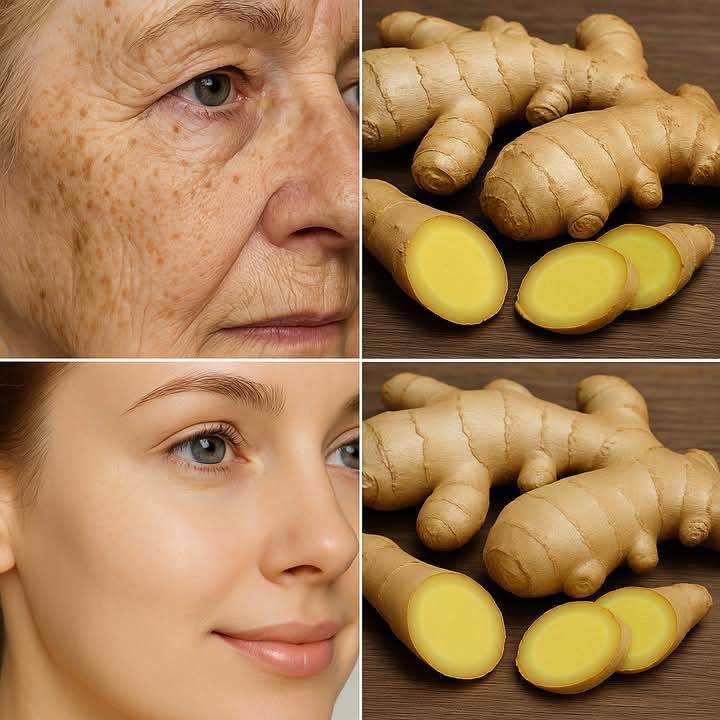Is Ginger Really 100 Times More Powerful Than Botox for Wrinkles?
We’ve all heard the buzz about natural remedies for aging, and today, ginger is stepping into the spotlight. The claim? Ginger is a powerhouse ingredient, potentially offering wrinkle-reducing benefits that could rival, or even surpass, Botox. Sounds too good to be true? Let’s dive into the science and find out what the truth is behind this spicy claim.
<!– 
The Science Behind Ginger and Skin Health
Ginger, scientifically known as Zingiber officinale, isn’t just a tasty spice; it’s packed with compounds that could benefit your skin. But can it truly outperform Botox? Let’s break down the key factors.
<!– 
Ginger’s Anti-Inflammatory Properties
One of the biggest reasons ginger is touted for its skin benefits is its powerful anti-inflammatory properties. Inflammation can accelerate aging and contribute to wrinkle formation. Ginger contains gingerol, a potent antioxidant that helps combat free radicals and reduce inflammation in the body.
- Reduces Inflammation: Gingerol targets inflammatory pathways, potentially slowing down the aging process.
- Antioxidant Power: Fights free radicals, protecting skin cells from damage.
- Promotes Circulation: Improved blood flow can bring more nutrients to the skin, promoting a healthy glow.
<!– 
Collagen Production and Ginger
Collagen is the holy grail of youthful skin, providing structure and elasticity. While ginger doesn’t directly contain collagen, some studies suggest it can stimulate collagen production. Certain compounds in ginger may help activate fibroblasts, the cells responsible for creating collagen.
- Fibroblast Activation: Ginger may help these cells produce more collagen.
- Skin Elasticity: Increased collagen can lead to firmer, more elastic skin.
- Wrinkle Reduction: Theoretically, boosted collagen could minimize the appearance of fine lines and wrinkles.
<!– 
Comparing Ginger to Botox: A Realistic Perspective
Now, let’s address the elephant in the room: is ginger *really* 100 times more powerful than Botox? Botox works by temporarily paralyzing muscles, which reduces the appearance of wrinkles caused by muscle movement. Ginger, on the other hand, works through anti-inflammatory and antioxidant mechanisms. They’re two different approaches. It’s highly unlikely ginger can provide the immediate, dramatic wrinkle reduction that Botox offers. The claim of being “100 times more powerful” is largely unsubstantiated and should be viewed with skepticism. However, consistent use of ginger (through diet or topical application) can contribute to overall skin health and potentially reduce the appearance of wrinkles over time. Research studies are ongoing to fully understand the extent of ginger’s benefits.
<!– 
How to Incorporate Ginger into Your Skincare Routine
Interested in trying ginger for yourself? Here are a few ways to incorporate it into your skincare routine:
<!– 
- Ginger Tea: Drinking ginger tea can provide internal antioxidant benefits.
- Ginger Face Mask: Mix grated ginger with honey and lemon juice for a brightening mask.
- Ginger-Infused Oil: Infuse ginger in a carrier oil like olive oil for a topical treatment.
- Dietary Inclusion: Add ginger to your meals for its overall health benefits, including skin health.
Conclusion: Ginger’s Potential and Realistic Expectations
While the claim that ginger is 100 times more powerful than Botox might be an exaggeration, ginger certainly holds promise as a natural ingredient for promoting skin health. Its anti-inflammatory and antioxidant properties can contribute to a healthier complexion and potentially minimize the appearance of wrinkles over time. Remember, consistency is key! Don’t expect overnight miracles. Instead, view ginger as a valuable addition to a holistic skincare approach that includes a healthy diet, regular exercise, and sun protection. So, should you ditch Botox for ginger? Probably not. But incorporating ginger into your routine could be a spicy secret to more radiant, youthful-looking skin.
